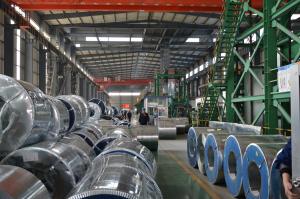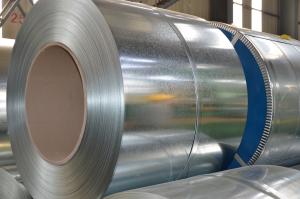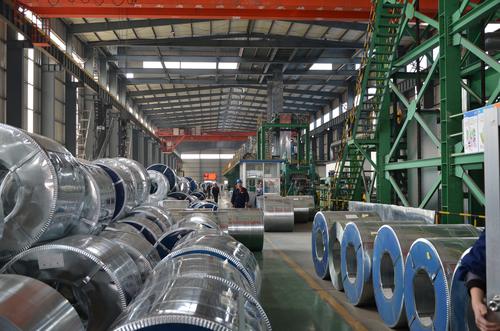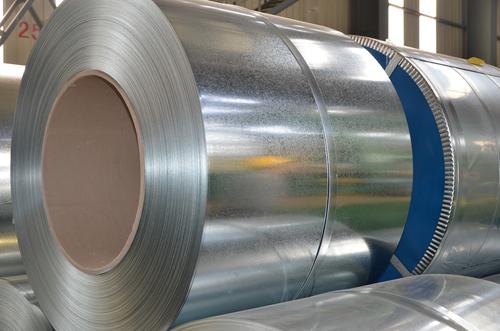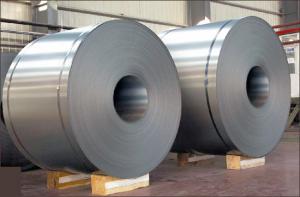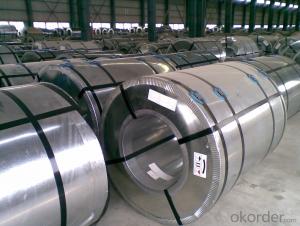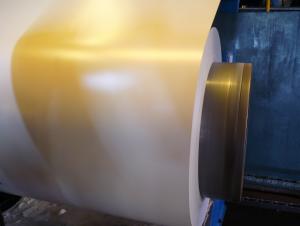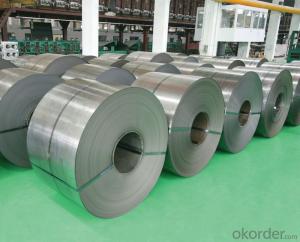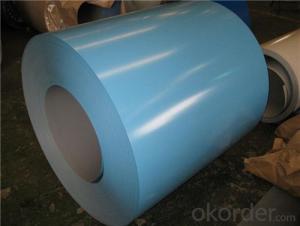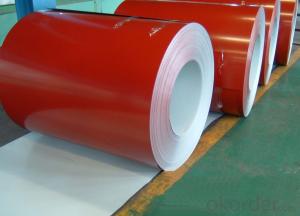galvanized steel coils
- Loading Port:
- China Main Port
- Payment Terms:
- TT OR LC
- Min Order Qty:
- -
- Supply Capability:
- -
OKorder Service Pledge
OKorder Financial Service
You Might Also Like
1) Quality Standard & Grade: JIS G3302, SGCC / ASTM 653M CQ/ EN10142 DX51D+Z
2) Thikness tolerance: +/-0.02mm Width tolerance:+/0.02mm
3) Zinc coating weight: 50g/m2
4) WEIGHT OF PER COIL: 3-5MT
5)Technology: cold rolled
6) Surface of Product: regular spangle / big spangle/ small spangle; Surface Treatment: chromated , non oiled, skin passed
7) Packing: export standard packing,packed with moisture resistant paper and metal
wrapping,securely tied for export,on metal skids7) Country of Origin :
SIZE:0.5*1250
- Q: How many percent carbon in low alloy steel and high alloy steel
- Steel is basically an alloy of iron and carbon that has more than 0% carbon and less than 2% carbon. The alloy of carbon and iron with more than 2% carbon is considered cast iron. The bessemer process converts cast iron to steel by injecting oxygen into molter cast iron to burn off the excess carbon. Steel is also modified by adding additional elements like silicon, molydenum, vanadium, chrome, etc.
- Q: 7850kg/cu.m density is typical for all type of steel? like reibar, I- beam and so on
- 90% of the steels used today are plain mild carbon steels consisting of iron with less than 1% carbon content and as such have a density of about 7750 kg/cubic meter. Some special steels which have a significant percentage of alloying elements such as chrome or manganese or other elements will have greater density bringing the steel up to about 8000 kg / cubic meter. There are a greater many factors influencing the exact density of a steel. Even for steels of exactly the same content of iron , carbon and other alloying elements, there may be a difference ( very small mind you ) in density due to work hardening. The difference in this case is due to movement of dislocations which become locked in the grain boundaries and this forms a more dense crystal structure. For this same reason, the theoretical density of steel (which does not take into account dislocations) is greater than the measured density of steel.
- Q: How do steel coils contribute to the marine vessel construction industry?
- Steel coils are essential components in the marine vessel construction industry as they play a crucial role in the fabrication of various structural elements of ships and boats. These coils are typically made of high-quality steel and are used in a variety of ways to contribute to the construction and performance of marine vessels. Firstly, steel coils are utilized in the construction of the hull, which is the main body of the ship. The hull requires strong and durable materials to withstand the harsh conditions of the sea, including waves, corrosion, and impacts. Steel coils provide the necessary strength and integrity to the hull, ensuring the vessel's structural integrity and safety. Moreover, steel coils are also employed in the fabrication of decks, bulkheads, and other internal structures of marine vessels. These components are crucial for dividing the ship into compartments, providing stability, and supporting various equipment and machinery. Steel coils are known for their excellent tensile strength, which allows them to bear heavy loads and resist deformation, making them ideal for constructing these vital components. Additionally, steel coils are used in the construction of propulsion systems and other mechanical parts of marine vessels. These coils are often shaped and formed into specific components, such as shafts, gears, and propellers, which are critical for the vessel's propulsion and maneuverability. The high strength and durability of steel coils ensure the reliability and efficiency of these mechanical systems, enabling smooth navigation and operation of the vessel. Furthermore, steel coils contribute to the marine vessel construction industry by enhancing the overall safety and longevity of ships and boats. Steel is known for its resistance to corrosion, which is a significant concern in marine environments due to the presence of saltwater. By utilizing steel coils, marine vessels can withstand the corrosive effects of seawater, reducing the need for frequent maintenance and repair. This, in turn, improves the lifespan of the vessel and reduces the risk of accidents or failures at sea. In conclusion, steel coils are indispensable in the marine vessel construction industry. These coils provide the necessary strength, durability, and resistance to corrosion, ensuring the safety, performance, and longevity of ships and boats. From the construction of the hull to the fabrication of internal structures and mechanical components, steel coils play a vital role in every aspect of marine vessel construction.
- Q: How are steel coils used in the production of agricultural implements?
- Steel coils are used in the production of agricultural implements as they are formed and shaped into various components such as blades, tines, or plowshares. These sturdy and durable steel components are then assembled into agricultural machinery like plows, cultivators, or harrows, which are essential for tasks like tilling soil, planting crops, and harvesting. The strength and resilience of steel make it an ideal material for agricultural implements, ensuring they can withstand the demanding conditions of farming and contribute to efficient and effective agricultural operations.
- Q: What are the challenges faced during steel coil processing?
- There are several challenges that can be encountered during steel coil processing. One of the main challenges is ensuring proper handling of the steel coils. Steel coils are heavy and can weigh several tons, so it is crucial to have the correct equipment and procedures in place to safely move and manipulate the coils. This includes using cranes, forklifts, or other lifting devices that are strong enough to handle the weight and size of the coils. Another challenge is maintaining the integrity of the steel coils during processing. Steel coils are susceptible to damage from scratches, dents, or other forms of physical deformation. It is important to have proper storage and handling procedures in place to minimize the risk of damage. Additionally, care must be taken during cutting, slitting, or other processing operations to ensure that the coils are not damaged or compromised. Quality control is another significant challenge in steel coil processing. It is essential to consistently produce coils that meet the required specifications, such as thickness, width, and surface quality. This requires meticulous inspection and monitoring throughout the entire processing chain, from receiving the raw material to the final product. Any deviations from the desired specifications can result in rejected coils or customer dissatisfaction. Efficiency and productivity are also challenges in steel coil processing. The processing operations need to be optimized to minimize waste, reduce downtime, and maximize throughput. This can involve implementing automation, improving production planning, and streamlining the workflow. Additionally, balancing the production speed with maintaining quality standards is crucial to ensure efficient and productive processing. Lastly, safety is a significant challenge in steel coil processing. The nature of the equipment and processes involved poses various risks to workers, including the potential for accidents, injuries, or exposure to harmful substances. It is vital to have proper safety protocols in place, provide adequate training to employees, and regularly inspect and maintain the equipment to ensure a safe working environment. In summary, the challenges faced during steel coil processing include handling the heavy coils, maintaining their integrity, ensuring quality control, optimizing efficiency and productivity, and ensuring a safe working environment. By addressing these challenges, steel coil processors can achieve smooth operations and deliver high-quality products to their customers.
- Q: Correct me if I am wrong, but steel is an alloy between iron and carbon. Does the carbon in the steel stops the iron from rusting or corroding? Also what is the difference between mild steel and stainless steel?
- Mild steel is an alloy. It is the most common form of steel. Mild steel (a so-called carbon steel) is a general term for a range of low carbon (a maximum of about 0.3%) steels that have good strength and can be bent, worked or can be welded into an endless variety of shapes for uses from vehicles (like cars and ships) to building materials. The carbon does not stop the material rusting or corroding. In addition to iron, carbon, and chromium, modern stainless steel may also contain other elements, such as nickel, niobium, molybdenum, and titanium. Nickel, molybdenum, niobium, and chromium enhance the corrosion resistance of stainless steel. It is the addition of a minimum of 12% chromium to the steel that makes it resist rust, or stain 'less' than other types of steel. The chromium in the steel combines with oxygen in the atmosphere to form a thin, invisible layer of chrome-containing oxide, called the passive film. The sizes of chromium atoms and their oxides are similar, so they pack neatly together on the surface of the metal, forming a stable layer only a few atoms thick. If the metal is cut or scratched and the passive film is disrupted, more oxide will quickly form and recover the exposed surface, protecting it from oxidative corrosion.
- Q: Theirs this two handed chinese sword on amazon with a forged combat steel blade and i was wandering if it means combat steel in the same sense that tempered carbon steel can be used?
- Combat steel? No such thing... Combat steel is a commercial product... not a true type of steel, since there is no ASTM grade of combat steel... And carbon steel is a WHOLE list of different types of steel, whether it's tempered or not... The company does not provide what steel specifications it has other than combat steel... So my best guess is that it's an alloy of 1095 or 301 spring tempered... both are resilient to snapping and fatigue, and common in modern swords... however, they do not hold an edge very well and are prone to rusting...
- Q: Is cold steel actually steel? Does it hurt? Why is it used in training? First one to goodly answer those questions gets 10 points.
- Cold steel was an expression originally used to signify a sword. From feeling the cold of the blade as it entered the body.
- Q: Please explain why steel is denser than wood.
- Steel is basically a mixture (not the compound) of iron and carbon. Iron, by itself is an element and so is carbon. The atoms of Iron are larger in size compared to carbon. All the atoms of all the elements, smaller or larger, are spherical. If naturally a solid, the atoms of all such elements have voids as their atoms are closely packed. You can imagine a basket of oranges; you could see that void or empty space (which I am speaking about) between four or more of the oranges put together. Now, when heated to more than about 1500 degrees celcius, Iron melts and atoms in molten form increase space between themselves. Raising the teperature to 1800 degree celcius, carbon is mixed with iron. At this stage it causes the spherical carbon atoms to fill in the spaces present amongst the spherical atoms of the iron. On cooling, already dense iron becomes denser because no space is left there between its atoms. This denser form of iron + carbon has become steel in which carbon is not more than 3 to 4% of the total volume. Wood is nothing but a fallen and dried tree's part. When green and alive, tree's stem and branches have pores in there texture, which are fillled with water and other biological fluids necessary for the life of the plant. When dried all the fluids, especially water gets evaporated. and the pore are empty now. The term Density, means mass divided by volume (kg / cubic meters). Iron + Carbon (the steel) so tightly packed and Iron having very high atomic weight is surely denser than wood with just carbon and a few other elements with no significant role to play in the mass calculation; particularly if their are empty pore spaces filled with air only. Imagine the mass (which common people mistakingly call the weight) in kilograms of a peice of steel with dimensions of 1 meter cube and imagine the same for the dried wood. What do you think---which one is denser?
- Q: In what ways can steel fail in use of buildings ad what can be done to prevent it?
- First let us see what steel is made from. PIG IRON, which is put into a blast furnace with other things to get the impurities out. the very high grated of steed include TUNGSTEN CARBIDE STEEL, which is used to make tooling. down to lower grades of steel to make other things. the stronger the steel that is required the less impurities that are in it. different steels are treated with different elements depending on what the steel is going to be used for, So if steel is Incorporated into a building and say the building caught fire enough heat could be produced to actually soften the steel and result in failure. hope this helps. Dr Knowitall.
Send your message to us
galvanized steel coils
- Loading Port:
- China Main Port
- Payment Terms:
- TT OR LC
- Min Order Qty:
- -
- Supply Capability:
- -
OKorder Service Pledge
OKorder Financial Service
Similar products
Hot products
Hot Searches
Related keywords
